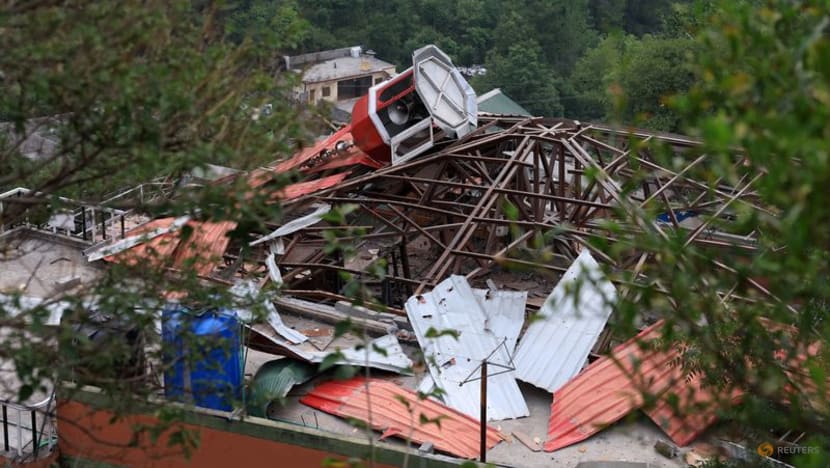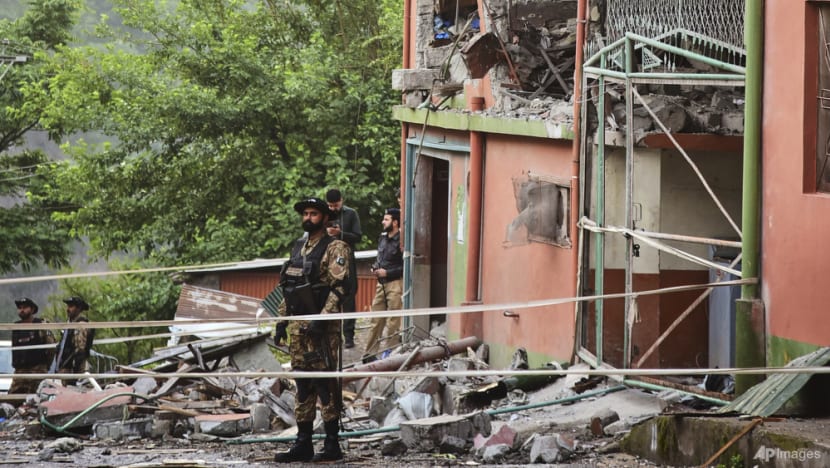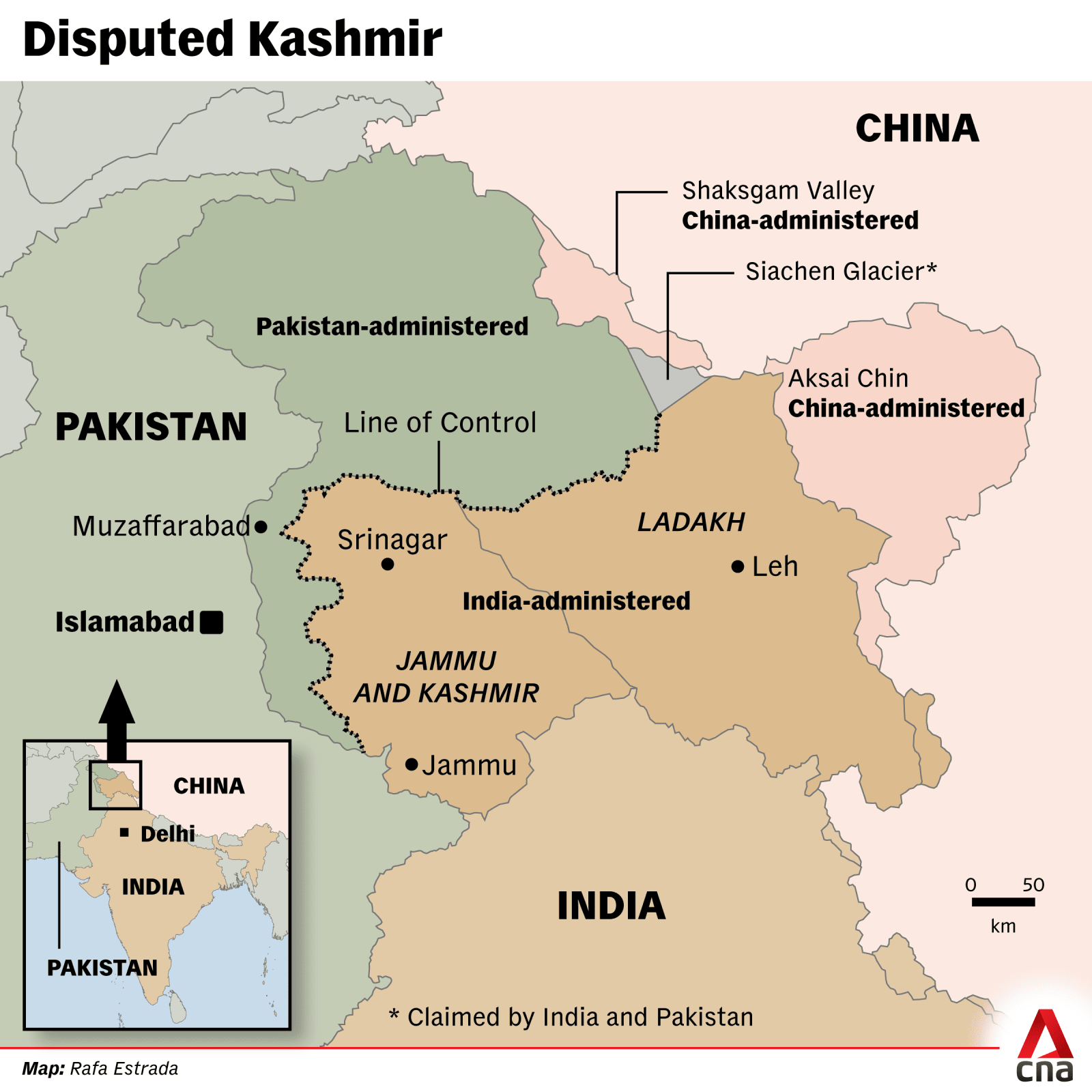What we know about India's missile strikes on Pakistan and their history of conflict
Tensions between India and Pakistan have been rising after an attack in India-administered Kashmir last month.

Damaged rooftop of Bilal Mosque is seen after it was hit by an Indian strike in Muzaffarabad, the capital of Pakistan-administered Kashmir, on May 7, 2025. (Photo: REUTERS/Akhtar Somroo)
India launched missile strikes on Pakistan and Pakistan-administered Kashmir on Wednesday (May 7), an assault Pakistan has called a "blatant act of war" in a major escalation between the nuclear-armed neighbours.
Tensions have been rising since a deadly attack on tourists in India-administered Kashmir last month.
Here's what we know about the fresh attacks, Kashmir and the history of conflict between the two countries.
India launches air strikes
India launched Operation Sindoor in the early hours of May 7, firing missiles on what it said were "precision strikes at terrorist camps" in Pakistan.
Sindoor means the red vermilion worn by married Hindu women, an apparent reference to the widows created by the Apr 22 attack that killed 26 men, most of them Hindu.
Islamabad has said six locations were targeted, including three parts of Pakistan-administered Kashmir and two cities - Bahawalpur and Muridke - in Pakistan's most populous province of Punjab.
Pakistan reported 26 civilian fatalities.
After India's missile strikes, the two armies exchanged intense shelling and firing at various points across their de facto border in Kashmir.
India's army later said three civilians were killed by Pakistani shelling into Indian-controlled Kashmir.
Pakistan's Punjab province declared a state of emergency, with hospitals and security forces on high alert.
Muzaffarabad, the capital of Pakistani Kashmir, lost power for a while after the explosions.
Schools in much of India's Jammu and Kashmir were shut on Wednesday.
What triggered the latest escalation?
Tensions between Pakistan and India reached their highest in years after an attack in the Pahalgam area of India-administered Kashmir on Apr 22.
Twenty-six men were killed after gunmen opened fire in the Baisaran Valley, a popular tourist destination. This was the region’s deadliest attack on civilians since 2000.
India said the Pakistani group Lashkar-e-Taiba, a United Nations-designated terrorist organisation, was behind the incident and blamed Islamabad for backing the attack.
The country also said it identified three attackers, including two Pakistani nationals, as "terrorists" waging a violent revolt against Indian rule in Muslim-majority Kashmir.
India has long accused Pakistan of helping separatists who have battled security forces in its part of the territory - accusations Islamabad denies.
Pakistan has denied any involvement in the attack and called for an independent probe into the incident.

Kashmir and a history of armed conflict
Kashmir, the site of the deadly attack, was at the centre of two wars between the two countries and remains a source of tension.
Both India and Pakistan claim the Himalayan region in full but rule it in part. India governs the Kashmir Valley, Jammu and Ladakh, while Pakistan controls Azad Kashmir and the northern areas.
Aksai Chin, a third part of the territory, is held by China.

Hindu-majority India and Muslim-majority Pakistan’s first war over Kashmir was in 1947, after the British ceded colonial control of the subcontinent.
India claimed Kashmir as its Hindu ruler then acceded to Delhi, while Pakistan cited popular support from the region's Muslim majority as a basis for its claim.
Fighting raged for months, until the UN intervened to establish a ceasefire line in 1949, leaving both countries with control of a part of the territory.
The second war over the region was triggered in 1965 after Pakistani forces crossed into India's portion of the disputed region. India launched a military incursion across the boundary in response.
The fighting spread outside Kashmir into many settled boundary areas, seeing pitched battles involving both ground and air forces, and some of the biggest tank battles in history.
The India- and Pakistan-administered parts of Kashmir are now split by the Line of Control, a de facto boundary separating the two regions.
Related:
How have tensions mounted?
India took a raft of punitive diplomatic measures against Pakistan a day after the attack, including the suspension of a key water-sharing treaty and the closure of the mainland border crossing with Pakistan.
Pakistan responded with a slew of measures as well.
Both sides closed their airspace to each other's airlines and suspended special South Asian visas that enabled people to travel between them.
They also declared each other's defence advisors in missions in New Delhi and Islamabad persona non grata.
Pakistan has paused all bilateral agreements and suspended all trade with India, including to and from any third country.
They exchanged nightly gunfire for more than a week along the Line of Control before New Delhi fired missiles at Pakistani territory early on Wednesday.
How has the international community reacted?
UN Secretary-General Antonio Guterres called for maximum military restraint between the two countries after India’s missile strikes, adding that the world cannot afford a military confrontation between New Delhi and Islamabad.
"The Secretary-General is very concerned about the Indian military operations across the Line of Control and international border,” his spokesperson said.
US President Donald Trump called the rising tensions between the nuclear-armed rivals a shame.
“I just hope it ends very quickly,” he said.
The White House said US Secretary of State Marco Rubio had spoken with his counterparts from India and Pakistan, encouraging both sides to engage in discussions to settle an escalating military confrontation.
China, which shares land borders with both countries and is a close ally of Pakistan, expressed "regret over India's military action this morning" and said it was "concerned about the current developments".
"We call on both India and Pakistan to prioritise peace and stability, remain calm and restrained and avoid taking actions that further complicate the situation," said a foreign ministry spokesperson.
What's been the impact on flights?
Several airlines, including India's largest airline IndiGo, Air India and Qatar Airways, cancelled flights in areas of India and Pakistan due to the closures of airports and airspace.
Pakistan International Airlines said airborne flights had been diverted to Karachi, while those on ground have been put on hold.
The conflict has also affected flight schedules elsewhere.
Taiwan's EVA Air said that it will adjust its flights to and from Europe to avoid airspace affected by fighting between India and Pakistan for safety reasons.
Korean Air said it had begun rerouting its Seoul Incheon-Dubai flights on Wednesday, opting for a southern route that passes over Myanmar, Bangladesh, and India, instead of the previous path through Pakistani airspace.
Thai Airways said that flights to destinations in Europe and South Asia would be rerouted starting early Wednesday morning, warning this could cause delays to some flights.














